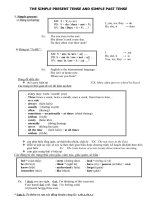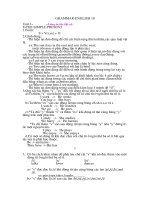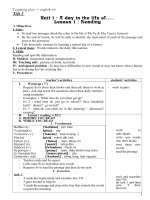giáo án tiếng anh 10 lê thị vuôn thư viện tài nguyên dạy học tỉnh thanh hóa
Bạn đang xem bản rút gọn của tài liệu. Xem và tải ngay bản đầy đủ của tài liệu tại đây (312.84 KB, 12 trang )
<span class='text_page_counter'>(1)</span><div class='page_container' data-page=1>
Miu !!!
Lazy boys
</div>
<span class='text_page_counter'>(2)</span><div class='page_container' data-page=2>
<b>Lesson I: Sentences (Câu)</b>
<b>Lesson I: Sentences (Câu)</b>
<i>I- Thành phần chính của câu:</i>
<i>I- Thành phần chính của câu:</i>
S
S
+
+
V
V
+
+
(O)
(O)
<i>chủ ngữ</i> <i>Động từ</i> <i>Tân ngữ</i>
I like football. My father is reading.
S V O S V
1- Subject (chủ ngữ)
1- Subject (chủ ngữ)
E.g.
E.g.
<i><b>They</b><b>They</b></i> watch TV every morning. watch TV every morning. <i><b>My books</b><b>My books</b></i> are new. are new.Đại từ Danh từ
</div>
<span class='text_page_counter'>(3)</span><div class='page_container' data-page=3>
•
<b><sub>Các đại từ làm chủ ngữ: </sub></b>
<b><sub>Các đại từ làm chủ ngữ: </sub></b>
•
<sub>I</sub>
•
<sub>You</sub>
•
We
•
<sub>He</sub>
•
<sub>She</sub>
•
It
•
They
<i><b>I</b> like Math. But <b>I </b>don’t like English.</i>
<i><b>You </b>are my students. <b>You </b>come here to learn </i>
<i>English.</i>
<i><b>We</b> are students of Dong Son I High School. <b>We</b></i>
<i>love our school.<b><sub>He</sub></b><sub> watches TV every morning.</sub></i>
<i><b>She</b> didn’t go to class yesterday.</i>
<i><b>It </b>isn’t my book. <b>It </b>is Lan’s.</i>
<i><b>They</b> play football every Sunday morning.</i>
</div>
<span class='text_page_counter'>(4)</span><div class='page_container' data-page=4>
2- Verbs (động từ)
2- Verbs (động từ)
•
E. g.
I watch TV every day. They don’t go to school in the afternoon.
He listen<i><b>s</b></i> to music every evening.
We play<i><b>ed</b></i> football yesterday.
*
<i>Động từ do chủ ngữ thực hiện nên phải biến đổi cho phù hợp </i><i>với chủ ngữ cuả nó và phù hợp với thời gian mà nó xảy ra. (gọi là </i>
<i>phép chia động từ)</i>
3- Object (tân ngữ)
E.g. I watch TV every day.
He listens to music every evening.
We played football yesterday.
</div>
<span class='text_page_counter'>(5)</span><div class='page_container' data-page=5>
* Các đại từ tân ngữ:
* Các đại từ tân ngữ:
<i>Mỗi đại từ chủ ngữ có </i>
<i><sub>Mỗi đại từ chủ ngữ có </sub></i>
<i>một đại từ tân ngữ tương ứng.</i>
<i>một đại từ tân ngữ tương ứng.</i>
Đại từ CN
<b>I</b>
<b>We</b>
<b>You</b>
<b>He</b>
<b>She</b>
<b>It</b>
<b>They</b>
Đại từ tân ngữ
me <i>Please give <b>me</b> the book.</i>
us <i>English makes <b>us</b> worried. </i>
you <i>I don’t believe <b>you</b>.</i>
him <i>I met <b>him </b>last night.</i>
her <i>We like <b>her</b> very much.</i>
it <i>Look at <b>it</b> please.</i>
</div>
<span class='text_page_counter'>(6)</span><div class='page_container' data-page=6>
II- C
II- C
ác thành phần khác:
ác thành phần khác:
•
<sub>1- Tr</sub>
<sub>ợ động từ:</sub>
E.g. I don’t like milk.
I didn’t buy milk yesterday.
We should study harder.
Can you swim?
<i>Hãy xác định động từ chính trong những câu trên.</i>
V
V
V
V
<i>Vậy <b>don’t</b>, <b>didn’t,</b></i>
<i><b>should</b> và <b>can</b> có</i>
<i> chưc năng gì trong </i>
<i>những câu văn</i>
<i> trên?</i>
</div>
<span class='text_page_counter'>(7)</span><div class='page_container' data-page=7>
* Sắp xếp từ cho đúng thứ tự trong câu:
* Sắp xếp từ cho đúng thứ tự trong câu:
1- coffee want he doesn’t .
2- in the morning TV do watch they?
3- buy your mother a new bike did yesterday?
4- open please door the.
5- our teacher we tomorrow visit will .
6- football can’t my brother play.
7- must my homework I do.
<i>He doesn’t want coffee.</i>
<i>Do they watch TV in the morning?</i>
<i>Did your mother buy a new bike yesterday?</i>
<i>Please open the door.</i>
<i>We will visit our teacher tomorrow.</i>
<i>My brother can’t play football.</i>
<i>I must do my homework.</i>
<b>I think you can</b>
<b> learn </b>
<b>English well</b>
<b> if you try</b>
</div>
<span class='text_page_counter'>(8)</span><div class='page_container' data-page=8>
2- Các loại trạng từ:
2- Các loại trạng từ:
a)
Trạng từ chỉ sự thường xuyên:
-
<sub>Ho</sub>
<sub>àn thành các trạng từ sau:</sub>
1) t i
-2) A l
-3) R – r – l y
4) e v
-5) U s - - - - y
6) - - t - n
<i>sometimes</i>
<i>always</i>
<i>rarely</i>
<i>never</i>
<i>usually</i>
<i>often</i>
* Hãy sắp xếp các trạng từ trên theo mức độ giảm dần
Always
Usually
Often
Sometimes
Rarely
never
100%
0%
•Hãy điền các trạng từ vào đúng vị trí trong những câu văn sau:
•1- We get up at 9 o'clock on Sunday morning. (always)
</div>
<span class='text_page_counter'>(9)</span><div class='page_container' data-page=9>
2- He can finish work at 4 o’clock. (sometimes)
3- I don’t get home before seven. (often)
4- She is late for meetings. (never)
5- They are on holiday in August. (usually)
6- Henry plays football on Mondays. (rarely)
7- They don’t stay for more than a week. (usually)
8- Monika meets her friends on Sunday mornings. (normally)
<i>- He can <b>sometimes</b> finish work at 4 o’clock.</i>
<i>- I don’t <b>often</b> get home before seven.</i>
<i>- She is <b>never</b> late for meetings.</i>
<i>-They are <b>usually</b> on holiday in August.</i>
<i>- Henry <b>rarely</b> plays football on Mondays.</i>
<i>- They don’t <b>usually</b> stay for more than a week.</i>
<i>- Monika <b>normally </b>meets her friends on Sunday morning.</i>
Trạng từ chỉ
sự
thường xuyên
đứng <i><b>trước</b></i>
động từ
thường,
<i><b>sau</b></i> “to be”
đứng <i><b>giữa</b></i>
trợ động từ và
động từ chính.
</div>
<span class='text_page_counter'>(10)</span><div class='page_container' data-page=10>
3- Trạng từ chỉ thời gian, địa điểm:
3- Trạng từ chỉ thời gian, địa điểm:
E.g. We usually play tennis on Sunday morning in the school
ground.
- We often have a drink at this pub after work.
<i>* <b>Trạng từ chỉ thời gian, địa điểm cho biết thời gian và địa </b></i>
<i><b>điểm mà hành động xảy ra, trả lời cho câu hỏi với </b><b>when</b><b> v</b><b>à</b></i>
<i><b>where</b><b>.</b></i>
</div>
<span class='text_page_counter'>(11)</span><div class='page_container' data-page=11>
* Ghi nhớ: thành phần chính của câu
* Ghi nhớ: thành phần chính của câu
+ trợ đt + tr.từ th. xuyên
Sentence (câu)
<b>S (CN</b>) <b>V</b> <b>O (TN)</b> + tr.từ t/g <sub>đ/đ</sub>
Object pronouns
(7 đại từ tân
ngữ)
Subje
ct
pron
ouns
(7 đạ
i từ
</div>
<span class='text_page_counter'>(12)</span><div class='page_container' data-page=12></div>
<!--links-->









